高一第一学期英语必修一,必修二知识点总结
高中英语必修一和必修二知识要点总结
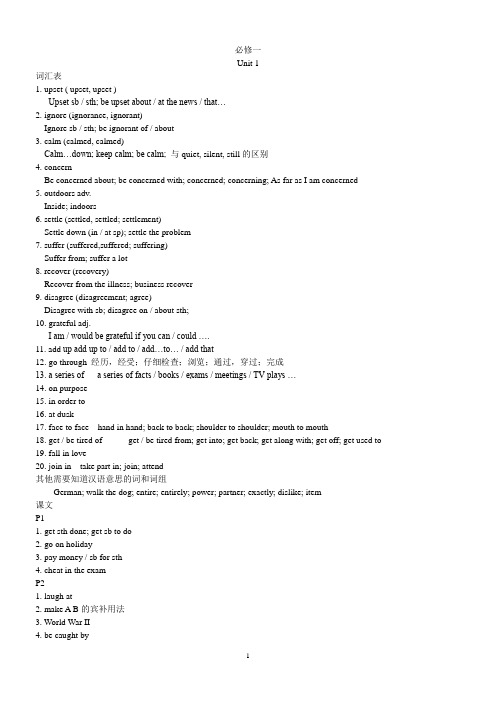
必修一Unit 1词汇表1. upset ( upset, upset )Upset sb / sth; be upset about / at the news / that…2. ignore (ignorance, ignorant)Ignore sb / sth; be ignorant of / about3. calm (calmed, calmed)Calm…down; keep calm; be calm; 与quiet, silent, still的区别4. concernBe concerned about; be concerned with; concerned; concerning; As far as I am concerned5. outdoors adv.Inside; indoors6. settle (settled, settled; settlement)Settle down (in / at sp); settle the problem7. suffer (suffered,suffered; suffering)Suffer from; suffer a lot8. recover (recovery)Recover from the illness; business recover9. disagree (disagreement; agree)Disagree with sb; disagree on / about sth;10. grateful adj.I am / would be grateful if you can / could ….11. add up add up to / add to / add…to… / add that12. go through 经历,经受;仔细检查;浏览;通过,穿过;完成13. a series of a series of facts / books / exams / meetings / TV plays …14. on purpose15. in order to16. at dusk17. face to face hand in hand; back to back; shoulder to shoulder; mouth to mouth18. get / be tired of get / be tired from; get into; get back; get along with; get off; get used to19. fall in love20. join in take part in; join; attend其他需要知道汉语意思的词和词组German; walk the dog; entire; entirely; power; partner; exactly; dislike; item课文P11. get sth done; get sb to do2. go on holiday3. pay money / sb for sth4. cheat in the examP21. laugh at2. make A B的宾补用法3. World War II4. be caught by5. hide away6. set down a series of the facts7. want sth to be …8. the hiding place9. be / grow crazy about10. everything to do with nature11. should have done / could have done12. have a good look at13. (far) too much light; much too heavy14. happen to do15. hold sb / sth in one’s power16. be able to do句型1. I wonder if / whether … 我想知道是否…… / 我不知道是否…..2. It is / was … that / who… 强调句型3. I can well remember that… 我依然清晰记得…..4. There was a time when + 定语从句曾有一段…….的时光5. It is the first (second, third…) time that sb / sth have (has) done 或I t was the first (second, third…) time that sb / sth had done 这是某人第几次做某事了6. It is no pleasure doing 做某事没有乐趣It is no good / use doing 做某事没有好处/ 没有用7. Nature is one thing that really must be experienced. 复习定语从句其它1. take no notice of2. draw the curtains3. have trouble with sb/sth; have trouble (in) doing… 在…..遇到了麻烦have difficulty (in)doing4. end the friendship5. communicate with6. take / follow / listen to one’s advice7. be filled with / be full of8. live in peace9. Good friends do not add up what they do for each other. (翻译)10. I still find it hard to make good friends with them. (find it + adj. / n. + (for sb)+ to do 发现做某事(对某人来说) 怎么样)Unit 2词汇表1. actually = in fact / as a matter of fact / in reality2. base n./v.Base A on B; be based on3. enrich 注意动词前缀en- (使…..) 如:enlarge, encourage, enable, endanger4. command n. / v.Command sb to do; command that sb (should)do; give the command to do; have a good command of5. request n. / v.Request sb to do; requ est that sb (should) do; at sb’s request6. recognize (recognization)Recognize sb / sth / one’s voice / that…; recognize sb / sth as / to be + n. / adj. be recognized as7. straight asj. /adv.A straight line; stand straight; go straight home8. because of 区别于because 的用法9. come up come up to; come up with come across; come true; come about; come on10. at present11. make use of make good / full / better use of = make the best / most of12. such as 区别于for example, that is, namely13. play a part in play a great / an increasing important part in take part in / take an active part in其他需要知道汉语意思的词和词组Official; native; apartment; gradually; vocabulary; latter; fluent; frequent; expression;课文P9-101. at the end of the 16th century2. later in the next century3. make / take / go on a voyage to …4. communicate wih5. be different from6. enrich the English language7. a separate identity8. a number of / the number of9. Today, more people speak English as their first, second or a foreign language than ever before. (比较级与than ever before 连用表示最高级)10. Native English speakers can understand each other even if they don’t speak the same kind of English. (even if 尽管,引导让步状语从句)11. So why has English changed over time? (over 介词,表示在某段时间内)12. At first, the English spoken in England between about AD450 and 1150 was very different from the English spoken today. (过去分词done做后置定语,表示被动或完成)13. Only time will tell. (翻译)P131. believe it or not2. all over the world3. be expected to do4. There is no such thing as standard English. (There is no such + 可数名词单数或不可数名词+ as… 就没有像……的人或物)5. This is because in the early days of radio, those who reported the news were expected to speak excellent English. (This / That / It is because… 这是/ 那是因为….., because引导表语从句)6. The USA is a large country in which many different dialects are spoken. (介词+which引导定语从句)其他1 Hold that elevator. 把电梯停住;按住电梯2 the size of the house3 keep going straight for two blocks4 encourage sb to do sth5 for short6 teach oneself7 keep warm8 work into the evening / midnight9 work by candle light (借助烛光工作)Unit 3词汇表1 journal journalist2 transport v. & n transport sth from A to B public transport 注意trans-前缀,表示“移动;从…到…” 如:transplant transform3 prefer vt. (preferred, preferred)prefer sb / sth; prefer to do; prefer doing; prefer A to B; prefer doing to doing; prefer to do rather than do4 disadvantage put sb at a disadvantage 注意:dis- 否定前缀,如,dislike, disagree, discontinue5 fare n. fare / fee / cost 区别6 persuade vt. persuasion n. persuasive adj.persuade sb into doing = persuade sb sb to do persuade sb out of doing = persuade sb not to do try to persuade sb to do7 graduate vi graduate from graduation n.8 schedule n. make a schedule for ahead of schedule on schedule9 organize vt organization n.10 determine vt determination n. determined adj.determine sb to do determine sb against be determined to do a determined look11 journey make a journey to12 attitude have an attitude to / towards13 forecast 注意:fore-前缀,表示“前”,如foretell foresee forehead14 reliable adj. a reliable friend15 view (preview, review, interview)n. have a good view of in one’s view view of the world / money / marriagevt. view … as16 ever since 常与现在完成时连用17 be fond of18 care about19 change one’s mind make up one’s mind keep / bear … in mind lose one’s mind take one’s mind off keep / fix one’s mind on / upon20 give in give in to give up give up doing give away give out give off21 as usual22 at midnight at noon at dusk其它需要记住汉语意思的词flow detail source pace boil wool flame beneath temple cave课文P181 dream about dream (dreamed, dreamed; dreamt, dreamt) vt & n. daydreaming n.d ream about / of dream / have a dream realize / achieve one’s dreams The dream comes true.2 take a great bike trip3 get sb intrested in sth4 organize the trip properly5 keep doing6 at an altitude of at a height of at the age of at the price of at a speed of7 more than 5,ooo meters more than + n. / adj. / no.8 the source of9 seem to do / be10 finally = at last = in the end11 be surprised to do12 at first13 the South China Sea14 Ever since middle school, my sister Wang Wei and I have dreamed about taking a great bike trip15 It was my sister who first had the idea to cycle along the entire Mekong River from where it begins to where it ends.16 She can be really stubborn.17 Although she didn’t know the best way of getting to places, she insisted that she organize the trip properly.18 I know my sister well.19 Once she has made up her mind, nothing can change it.20 It becones rapids as it passes through deep valleys, travelling across western Yunnan Province.21 We were both surprised to learn that half of the river is in China.P221 feel like doing2 be dressed in long wool coats3 in the late afternoon4 the setting sun5 find sb doing (find ourselves cycling)6 change … for …7 put up (our tent)8 stay awake9 the flames of our fire10 for company11 lie beneath the stars12 We can hardly wait to do …P591 be similar to2 afford to do3 be tired from / of4 make jokes about5 many more people6 in high spirits7 come true8 make it easier for us to cycle重点语法进行时现在进行时:表示现在正在进行的动作,由“be动词+ 动词的现在分词”构成。
高一英语人教课标必修1-2语法总结
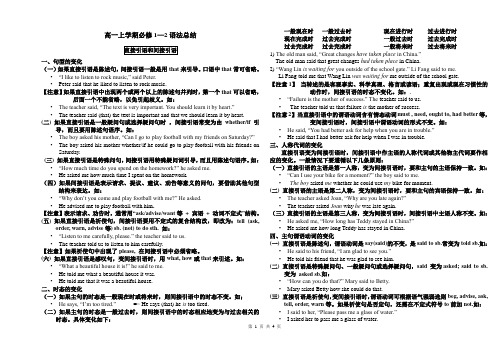
高一上学期必修1—2语法总结一、句型的变化(一)如果直接引语是陈述句,间接引语一般是用that来引导。
口语中that常可省略。
•“I like to listen to rock music,” said Peter.•Peter said that he liked to listen to rock music.【注意】如果直接引语中出现两个或两个以上的陈述句并列时,第一个that可以省略,后面一个不能省略,以免引起歧义。
如:•The teacher said, “The text is very important. You should learn it by heart.”•The teacher said (that) the text is important and that we should learn it by heart. (二) 如果直接引语是一般疑问句或选择疑问句时,间接引语常变为由whether/if引导,而且要用陈述句语序。
如:•The boy asked his mother, “Can I go to play football with my friends on Saturday?”•The boy asked his mother whether/if he could go to play football with his friends on Saturday.(三) 如果直接引语是特殊问句,间接引语用特殊疑问词引导,而且用陈述句语序。
如:•“How much time do you spend on the homework?” he asked me.•He asked me how much time I spent on the homework.(四)如果间接引语是表示请求、提议、建议、劝告等意义的问句,要借助其他句型结构来表达。
如:•“Why don’t you come and play football with me?” He asked.•He advised me to play football with him.【注意】表示请求、劝告时,通常用“ask/advise/want等+ 宾语+ 动词不定式”结构。
全了!高中英语必修1—选修8所有知识点,暑假收藏背诵!(附电子版)
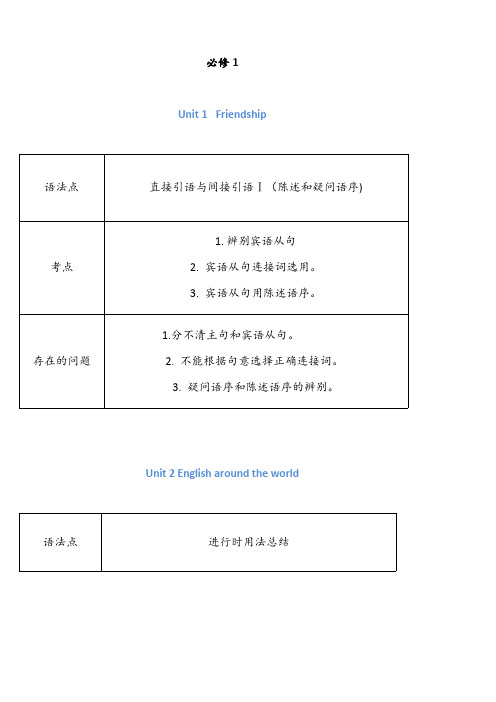
必修1Unit1Friendship语法点直接引语与间接引语Ⅰ(陈述和疑问语序)考点1.辨别宾语从句2.宾语从句连接词选用。
3.宾语从句用陈述语序。
存在的问题1.分不清主句和宾语从句。
2.不能根据句意选择正确连接词。
3.疑问语序和陈述语序的辨别。
Unit2English around the world语法点进行时用法总结考点1.进行时表正在进行的动作或存在的状态2.进行时表将来存在的问题1.进行时的正确结构不明确。
2.进行表将来和将来表将来的异同点不明确。
Unit3Travel journal语法点进行时用法总结考点1.进行时表正在进行的动作或存在的状态2.进行时表将来存在的问题1.进行时的正确结构不明确。
2.进行表将来和将来表将来的异同点不明确。
Unit4Earthquakes语法点定语从句Ⅰ(关系代词)考点1.定语从句辨别。
2.定语从句中先行词的辨别。
3.定语从句中选用关系代词。
存在的问题1.主从复合句中分不清主句和定语从句。
2.找不出定语从句的先行词3.分辨不清先行词在定语从句中担当句子成分Unit5Nelson Mandela—a modern hero语法点定语从句Ⅱ(关系副词)考点1.定语从句辨别。
2.定语从句中先行词的辨别。
3.定语从句中选用关系副词。
存在的问题1.找不出定语从句的先行词2.分辨不清先行词在定语从句中担当句子成分必修2Unit1Cultural relics语法点限制定从和非限定从考点1.辨别定从和非限定从2.that不能用于非限定从3.as与which引导非限定从的区别存在的问题1.关系代词和关系副词的选择2.分不清关系副词也能引导非限定从Unit2The Olympic Games语法点一般将来时的被动语态考点1.一般将来时的被动语态的结构2.判断一般将来时存在的问题1.时态判断错误2.没有掌握被动语态Unit3Computers语法点现在完成时的被动语态考点1.现在完成时的被动语态的结构2.判断现在完成时存在的问题1.没有掌握现在完成时的时间状语2.与一般现在时、过去时的区别分辨不清Unit4Wildlife protection语法点现在进行时的被动语态考点1.现在进行时的被动语态的结构2.与现在完成进行时的比较3.与非谓语动词一起考查存在的问题1.没有掌握现在进行时的被动语态2.与现在完成进行时的区别分辨不清Unit5Music语法点定语从句(介词+关系代词)考点1.根据谓语动词选介词2.此种情况只有两个关系代词which和whom存在的问题1.介词选用错误2.不会分析句子成分必修三Unit1Festivals around the world语法点情态动词Ⅰ(may,might,can,could,will, would,shall,should,must,can’t)考点1.情态动词本身意思的考查2.与虚拟语气一起考查存在的问题1.分不清各个情态动词的具体含义,以及在哪个情况下用哪个情态动词。
高一英语必修一、二语法汇总
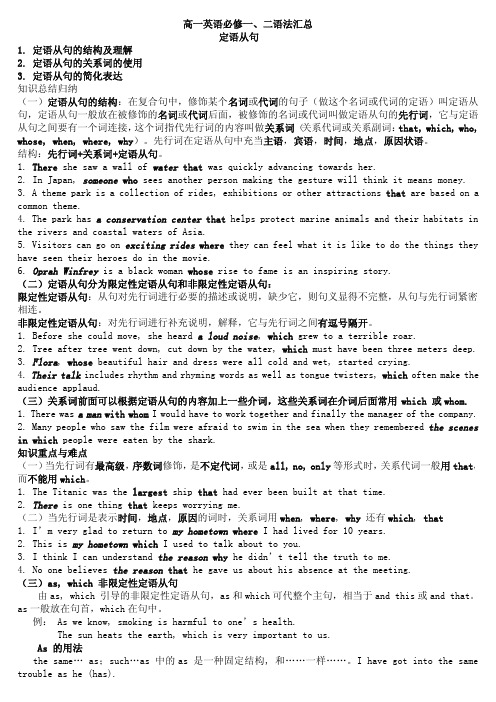
高一英语必修一、二语法汇总定语从句1.定语从句的结构及理解2.定语从句的关系词的使用3.定语从句的简化表达知识总结归纳(一)定语从句的结构:在复合句中,修饰某个名词或代词的句子(做这个名词或代词的定语)叫定语从句,定语从句一般放在被修饰的名词或代词后面,被修饰的名词或代词叫做定语从句的先行词,它与定语从句之间要有一个词连接,这个词指代先行词的内容叫做关系词(关系代词或关系副词:that,which,who, whose,when,where,why)。
先行词在定语从句中充当主语,宾语,时间,地点,原因状语。
结构:先行词+关系词+定语从句。
1.There she saw a wall of water that was quickly advancing towards her.2.In Japan,someone who sees another person making the gesture will think it means money.3.A theme park is a collection of rides,exhibitions or other attractions that are based on a common theme.4.The park has a conservation center that helps protect marine animals and their habitats in the rivers and coastal waters of Asia.5.Visitors can go on exciting rides where they can feel what it is like to do the things they have seen their heroes do in the movie.6.Oprah Winfrey is a black woman whose rise to fame is an inspiring story.(二)定语从句分为限定性定语从句和非限定性定语从句:限定性定语从句:从句对先行词进行必要的描述或说明,缺少它,则句义显得不完整,从句与先行词紧密相连。
高一必修一二语法知识点

高一必修一二语法知识点第一部分:名词名词是指表示人、事物、动作、状态的词语,常用来作主语、宾语、定语、宾补等。
常见的名词有普通名词、专有名词、集体名词等。
名词还有单数和复数之分,形式上的变化包括加s或es、变y为i再加es、不变形等。
举例:1. 普通名词:book, table, dog2. 专有名词:China, John, IBM3. 集体名词:family, group, team第二部分:代词代词是用来代替名词或名词性词组的词语,可以减少重复,提高表达的效率。
代词分为人称代词、物主代词、指示代词、疑问代词、不定代词等。
举例:1. 人称代词:I, you, he, she, it2. 物主代词:mine, yours, his, hers, its3. 指示代词:this, that, these, those4. 疑问代词:who, what, which, whose5. 不定代词:someone, anyone, everyone, something, anything, everything第三部分:动词时态动词时态用来表示动作或状态发生的时间。
英语中常见的时态包括一般现在时、一般过去时、一般将来时、现在进行时、过去进行时、现在完成时等。
举例:1. 一般现在时:I play football every Sunday.2. 一般过去时:She visited her grandparents yesterday.3. 一般将来时:We will go to the beach next summer.4. 现在进行时:They are watching a movie now.5. 过去进行时:He was studying when I called him.6. 现在完成时:We have finished our homework.第四部分:形容词与副词形容词用来描述名词或代词,副词用来修饰动词、形容词或其他副词。
人教版英语高一上学期(必修一二)知识点总结
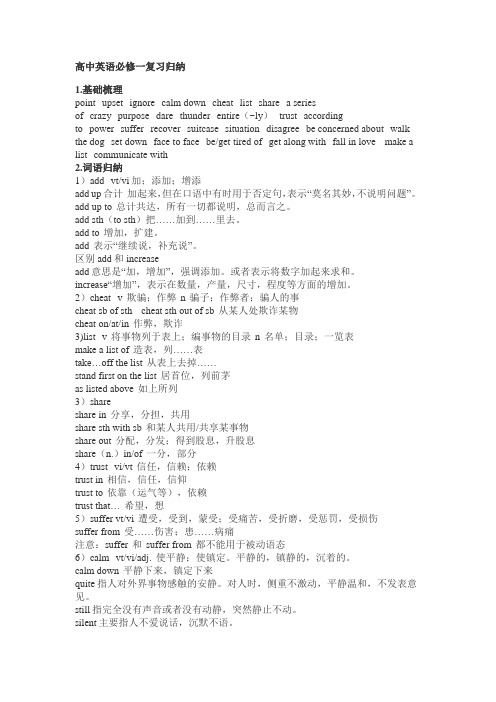
高中英语必修一复习归纳1.基础梳理point upset ignore calm down cheat list share a seriesof crazy purpose dare thunder entire(~ly)trust accordingto power suffer recover suitcase situation disagree be concerned about walk the dog set down face to face be/get tired of get along with fall in love make a list communicate with2.词语归纳1)add vt/vi加;添加;增添add up合计加起来,但在口语中有时用于否定句,表示“莫名其妙,不说明问题”。
add up to 总计共达,所有一切都说明,总而言之。
add sth(to sth)把……加到……里去。
add to 增加,扩建。
add 表示“继续说,补充说”。
区别add和increaseadd意思是“加,增加”,强调添加。
或者表示将数字加起来求和。
increase“增加”,表示在数量,产量,尺寸,程度等方面的增加。
2)cheat v 欺骗;作弊n 骗子;作弊者;骗人的事cheat sb of sth cheat sth out of sb 从某人处欺诈某物cheat on/at/in 作弊,欺诈3)list v 将事物列于表上;编事物的目录n 名单;目录;一览表make a list of 造表,列……表take…off the list 从表上去掉……stand first on the list 居首位,列前茅as listed above 如上所列3)shareshare in 分享,分担,共用share sth with sb 和某人共用/共享某事物share out 分配,分发;得到股息,升股息share(n.)in/of 一分,部分4)trust vi/vt 信任,信赖;依赖trust in 相信,信任,信仰trust to 依靠(运气等),依赖trust that… 希望,想5)suffer vt/vi 遭受,受到,蒙受;受痛苦,受折磨,受惩罚,受损伤suffer from 受……伤害;患……病痛注意:suffer 和suffer from 都不能用于被动语态6)calm vt/vi/adj. 使平静;使镇定。
高中英语必修一、二单元知识点总结

必修一Unit 1直接引语与间接引语(Ⅰ)一.定义:1.直接引语:直接引述别人的原话2.间接引语:用自己的话转述别人的话二.直接引语变间接引语时要注意一下一个方面(1)陈述句:变间接引语时语序不变(2)一般疑问句:变间接引语时应首先在主句的谓语动词后加if/whether.再把语序变陈述语序(3)特殊疑问句:仍保持原有的疑问词,但语序变成陈述语序eg. He asked ,”Are you going home this weekend?”→He asked if/whether I was going home this weekend.“What do you want,Sara?” Mr Li asked.→Mr Li asked Sara what she wanted.3.某些成分的变化与不变(1).直接引语转化为间接引语时从句要注意5个方面的变化:①标点符号的变化“一主二宾三不变”及:直接引语中主语为第一人称则变为间接引语时人称按主语的人称变化;直接引语中主语为第二人称则变为间接引语时,人称与主句的宾语一致;若间接引语中主语为第三人称则变成间接引语时人称一般不需要变化。
④时态的变化一般现在时→一般过去时现在进行时→过去进行时现在完成时→过去完成时一般过去时→过去完成时过去完成时不变一般将来时→过去将来时⑤指示代词、时间状语、地点状语和动词的变化this→thatthese→thosenow→thenago→before/earliertoday→that dayyesterday→the day beforetomorrow→the next/following daythe day after tomorrow→in two days’ timecome→gohere→therethe day before yesterday→two days before/earliereg. He said ,”There books are mine.”→He said those books were his.(2)直接引语转化为间接引语时态五不变①直接引语为客观真理、永恒不变的事实、谚语或名人名言时eg .”The earth moves around the sun ,” the teacher told me.→The teacher told me the earth moves around the sun.Miss Guo said,”Where there is a sill,there is a way .“→Miss Guo said Where there is a sill,there is a way .②直接引语中有具体变过去的时间状语eg .Xiao Lin said ,”I was born on July 29,1992.”→Xiao Lin said she was born on July 19,1992.③习惯性动作或说话时仍然存在的情况eg .The boy said to us ,” I usually go to bed at ten every day .”→The boy told us he usually go to bed at ten every day.④当直接引语表示的客观时刻表时eg .Tom said,” The plane takes off at 6:30 a.m.”→Tom said the plane takes off at 6:30 a.m.⑤谓语中含有would,should,might,must,used to,had,hetter等eg .Tony said ,”Y ou should get up early.”→Tony said we should get uo early.Unit 2直接引语和间接引语(Ⅱ)一.直接引语为祈使句,变成间接引语时,常构成简单句型,可以按下列结构进行变化1.当祈使句表示要求和命令时,变间接引语常采用tell/command/order sb to do sth 的形式eg .”Hurry up .“He said .→He told me to hurry up.2.当祈使句表示请求时,变间接引语常采用ask/request/beg sb to do sth的形式eg .He said,”Please don’t be late.”→He asked me not to be late.二.句型变化注意事项1.直接引语中的呼语是祈使的对象,改为间接引语时常做引述动词的宾语.如原句中没有呼语,通常要加上宾语me,him,us等eg .He said,”Go and tell her,Jim.”→He asked Jim to go and tell her.2.直接引语中如果有客气的please或表示强调的助动词do,改为间接引语时必须去掉eg .He said to me,”Sit down,please.”→He asked me to sit down.Unit 3将来时1.be + v-ing 表将来时,当句子涉及确切的计划,明确的意图和为将来安排好的活动时,可用进行时表将来时。
(完整)高一英语必修一二语法点

高一英语必修一二语法点1.第一二单元:直接引语变间接引语(P.9 and 33)2.第三单元:现在进行时表将来3.第四单元:定语从句(关系代词)4.第五单元定语从句(关系副词)必修二1.第一单元:定语从句(限制性定语从句,非限制性定语从句)2.第二单元:一般将来时的被动语态(will be p.p)3.第三单元:现在完成时的被动语态(has\have p.p)4第四单元:现在进行时的被动语态(is\am\are being p.p)5.第五单元:定语从句(介词+关系代词)定语从句结构:先行词+关系词(连接词)+从句① 行词是人② 先行词是物③ 一般情况下考的简易的类型:④ 物用which人用who⑤ 所属关系用whose⑥ 逗号之后不可that⑦ 特殊that要牢记特殊that 考点1. all,some,any,no,little,much,few,thing系列,body系列,none, the one.2.the+ 序数词(first,second,last,next)the very, the only3.人+物4.开头已经有who,为避免重复,改用that.定语从句分类:2种1.限制性定语从句2.非限制性定语从句(标志是,)意义上基本上没有区别只通过形式判断就行例句:Yesterday I sold a bike, which I bought a month ago.非限需要注意的问题:千万不可用that, 除此之外连词都可以选择比如常用到的which,who, where, whom….强调句强调句构成:It is\was 被强调部分that +从句例子:I like winter.It is I that like winter.(强调主语)It is winter that I like.(强调宾语)现在进行时表将来结构:am\is\are + doing现在进行时表将来常用词:come go start arrive leave stay初高中误区:am\is\are + doing 不仅仅是现在进行时的标志在高中新的语法知识中:它还能表示将来= will被动语态列举子:I study English.(一般现在时)English is studied by me.I studied English last year. (一般过去时)English was studied by me last year.I am studying English now.(现在进行时)English is being studied by me now.I have studied English for one year.(现在完成时)English has been studied by me for one year.I will study English next week.(一般将来时)第二步:找出时间状语的词现在进行:now, look…现在完成:since, yet, by now,by the end ofever sincefor +一段时间一般将来时:next +时间状语tomorrowin the future……第三步:选择被动语态形式。
- 1、下载文档前请自行甄别文档内容的完整性,平台不提供额外的编辑、内容补充、找答案等附加服务。
- 2、"仅部分预览"的文档,不可在线预览部分如存在完整性等问题,可反馈申请退款(可完整预览的文档不适用该条件!)。
- 3、如文档侵犯您的权益,请联系客服反馈,我们会尽快为您处理(人工客服工作时间:9:00-18:30)。
知识点
所有知识点
重点难点
1
必修1第一单元词汇课文
1. Friendship主题阅读词汇
2. 宾语从句复习
2
直接引语和间接引语
1. 直接引语和间接引语的转换
2. 宾语从句写作
3
必修1第二单元词汇课文
1. 英语语言文化知识扩展
2. Байду номын сангаас调句
4
宾语从句
1. 拓展名词性从句体系
2. 掌握强调句
5
必修1第三单元词汇课文
14
一般将来时的被动语态
被动语态的结构和关键词
15
必修2第三单元词汇课文
重点词汇短语:in common, calculate, solve, explore, as a result, anyhow, consist of, signal, download
16
现在进行时的被动语态
被动语态的结构和关键词
17
必修2第四单元词汇课文
重点单词短语:decrease, loss, respond, relief, succeed, affect, employ, harm, incident, come into being, bite, pay attention to
18
现在完成时的被动语态
被动语态的结构和关键词
19
必修2第五单元词汇课文
重点词汇短语:pretend, to be honest, attach to, earn, in different direction, rely on, sort out, sensitive, devotion, confident, break up
20
定语从句
关系代词和关系副词的区别
关于旅行过程涉及的词汇
6
现在进行时表将来
动词的时态
7
必修1第四单元词汇课文
关于地震的相关词汇
8
定语从句
定语从句的关系代词及其用法
9
必修1第五单元词汇语法
写出正确的定语从句
10
期中考试复习
1. 必修1的重点词汇短语
2. 定语从句和宾语从句
11
必修2第一单元词汇课文
重点词汇短语:survive, in search of, amazing, select, fancy, design, prove, eevidence, explode, doubt, worth, entrance
21
复习必修1-2的知识点
1. 必修2的词汇短语
2. 被动语态和定语从句
12
定语从句
限制性和非限制性定语从句的区别
13
必修2第二单元词汇课文
重点词汇短语:compete, take part in, medal, stand for, charge, advertise, marry, bargain, admit, replace, instruction, deserve
